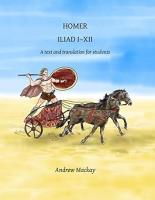
Machaira Press (2025) h/b 675pp £29.95 (ISBN 9781739513832)
‘This edition of the Iliad owes its origin to the realisation that there was no text of Homer with a literal line for line English translation on the same page to help Classics students new to Homer’s dialect and with limited time at their disposal. It is also suitable for the general reader who wishes to get as close as one can in English to the excitement of reading this greatest of all epic poems in the original Greek.’
Since English does not work like ancient Greek, it is inevitable that there will be places in these two heavyweight, elegantly designed volumes where the translation does not exactly flow off the pen. That will do little credit to the poet, but it is a price that has to be paid. M. manages the problem pretty well.
Which things having been said, for those of us who do know Greek, it makes for a fascinating read. Your reviewer picked out book 8 of the Iliad at random and read it with close attention to the translation and the notes and was impressed. M. is sensitive to the nuances of the language and catches them as best as English can. The slightly archaic language (‘thither’, ‘thus’, ‘forth’, ‘lest’, ‘smitten’ and so on) seems somehow appropriate. (For the second edition, ἀτιμήσουσι (l.163) is future, and smooth breathings have replaced grave accents at ll.190 and 514.)
M. is, of course, alert to the need to provide grammatical and other sorts of help. He does this in two ways:
(i) His Introduction in I-XII, but not repeated in XIII-XXIV, discusses certain aspects of ‘Homer’s language, grammar and style that can cause problems’, on pages numbered in Roman. Two problems here: the notes do not include dialect, which means that those not acquainted with Homer will struggle to deal with much of the language, beginning with e.g. 1.1. Πηληϊάδεω and 1.4. κύνεσσιν; and when he refers to this Introduction in XIII-XXIV he refers to it without reference to I-XII but simply by the Roman script – in which he has also written his synopses of each book!
(ii) Where he spots linguistic or other problems, he attaches superscript numbers to the translation, which he cross-refers to helpful notes at the back of each volume. He says nothing about metre but suggests users turn to other available sources.
This reviewer is not quite persuaded by M.’s decision on the layout of the text. Each page contains 15 lines of Greek in the top half and 15 lines of its translation in the bottom half. Admittedly, it is very attractive to have a clean page containing just text and translation but bouncing up and down from one to the other becomes rather irritating, when it was perfectly possible to have the text on the left-hand page and the translation exactly opposite on the right. Further, such a layout would mean that the notes could have been placed at the bottom of the double-page spread, rather than at the back. That of, course, would mean that one would not have exactly the same number of lines of text on every double-page spread, but that surely is not a loss, set against the gain of having help there in front of you,
Both texts also provide synopses of each of the books they contain, a list of places where M.’s text differs from M.L. West’s Teubner edition (1998-2000) – one wonders what advantage the intended audience will gain from that - bibliographies, an index of names referred to in the notes, a grammatical index and a Greek index.
But whatever the author’s educational and design decisions, let alone the reviewer’s tastes, it is the translation that counts. Here is the proof of the pudding from a famous passage, to be read in association with the Greek (Iliad 9.307-327, with footnote at 327):
Answering him swift footed Achilles said:
Zeus born son of Laertes, resourceful Odysseus,
it is necessary to speak out bluntly the word
that I have in mind, and how it is going to turn out,
so that you don't sit by me, coaxing one this way, one that.
For that man is as hateful to me as the gates of Hades
who hides one thing in his heart but says another;
so I'll speak as seems to me to be best.
I think that neither Atreus’ son Agamemnon will persuade me,
nor the other Danaans, since there was not, it seems, any gratitude
for battling against hostile warriors constantly, unceasingly.
The fate is equal, for someone staying back, and if one fights his hardest –
both coward and brave held in one and the same honour!
They die alike, the man who does nothing and he who achieves much.
Nor is any profit laid up for me, when I have suffered hardship at heart,
always risking my life to do battle.
As a bird brings a morsel to her unfledged chicks
whenever she finds one, yet it goes badly for herself,
so I too have spent many sleepless nights
and passed bloodstained days fighting,
battling against men for the sake of their wives.(26)
(26) ὀάρων: He seems to refer to Helen, rather than women as spoils of war.
Peter Jones
